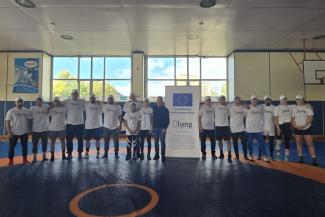With Support of Community, Al Obaidi is Painting a Bright Future
Saturday, June 20, 2020 - 11:58 By United World Wrestling Press

INZING, Austria (June 20) -- Aker Al Obaidi had been working as a painter for two years before Benedikt "Mo" Ernst finally convinced the young Iraqi refugee to move to the small town of Inzing, Austria.
The small town, population 4000, intimidated the former Baghdad resident. He'd always known bigger cities, and found comfort in wrestling.
To help, Coach "Mo" furnished an apartment for Al Obaidi and set up the young Greco-Roman grappler with a series of training opportunities. After a few weeks of acclimating to the new city, Al Obaidi invited Mo over for dinner and showed him the job he'd done painting the apartment.
It was not what Coach was expecting. Greeting him in the living room was the large five-ring logo of the Olympic Games.
"I painted the Rings on this wall because I want to see them every day," said Al Obaidi. "This is my motivation to work as hard as I can and reach my goal!“
Shortly after painting the Rings on his wall AL Obaidi and Coach Mo received word from the IOC that they had chosen Al Obaidi for the IOC Refugee Athletic Scholarship and would be supporting his Olympic journey.
Members of the Austrian national team who live in Inzing have helped provide Al Obaidi the training he needs to prepare for the Olympic Games, as he also attends every camp and tournament of the Austrian wrestling federation.
Al Obaidi's training during COVID has been difficult since he's not allowed to train in the training hall. Instead his coach has organized a special program for him to maintain his shape.
"He is one of the motivated guys I have," said Mo. "He has developed his strength and endurance very well during this hard time."
Like most of the wrestling world Al Obaidi isn't quite sure what will happen with COVID-19, but for now he plans to start wrestling training once cleared by the Austrian government - maybe as early as July.
The plans then include training camps and possibly trips to the U23 Europeans in Bucharest at the beginning of October and the U23 World Championship in Finland. If he's very lucky with travel arrangements, maybe some international training camps in Hungary, Germany and Ukraine between tournaments.
"He works hard and I know if Aker qualifies for the Olympics in Tokyo 2021," said Mo. "His dream will come true."


Share your thoughts.
Comments